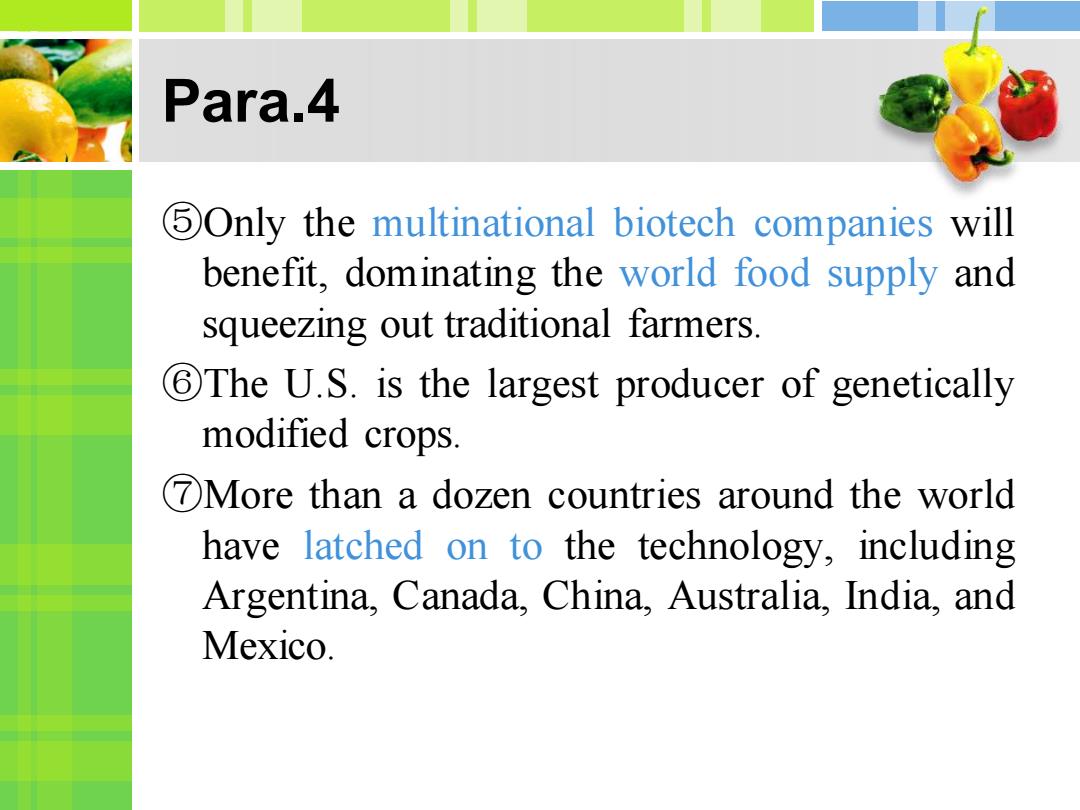
Para.3 If this shocks you,a new USDA-funded survey shows you're not alone.Researchers from the Food Policy Institute at Rutgers'Cook College found that only 52%of Americans realized that genetically modified foods are sold in grocery stores and only 26%believed that they have ever eaten genetically modified foods ---a modest 6%increase since 2001. But what exactly is genetically modified food?Is it safe to eat?Why isn't it labeled in the U.S.?The European Union and the U.S.are boxing it out
Para.3 If this shocks you, a new USDA-funded survey shows you’re not alone. Researchers from the Food Policy Institute at Rutgers’ Cook College found that only 52% of Americans realized that genetically modified foods are sold in grocery stores and only 26% believed that they have ever eaten genetically modified foods --- a modest 6% increase since 2001. But what exactly is genetically modified food? Is it safe to eat? Why isn’t it labeled in the U.S.? The European Union and the U.S. are boxing it out

Para.4 DThe U.S.government's position:Genetically engineered crops are safe,resist disease better, and can provide much-needed food in starving nations. 2The EU position:Keep it out. 3We prefer organic,which is much healthier. 4The risk of genetically modified foods to health and the environment outweigh the benefits
Para.4 ①The U.S. government’s position: Genetically engineered crops are safe, resist disease better, and can provide much-needed food in starving nations. ②The EU position: Keep it out. ③We prefer organic, which is much healthier. ④The risk of genetically modified foods to health and the environment outweigh the benefits

Para.4 5Only the multinational biotech companies will benefit,dominating the world food supply and squeezing out traditional farmers. 6The U.S.is the largest producer of genetically modified crops. DMore than a dozen countries around the world have latched on to the technology,including Argentina,Canada,China,Australia,India,and Mexico
Para.4 ⑤Only the multinational biotech companies will benefit, dominating the world food supply and squeezing out traditional farmers. ⑥The U.S. is the largest producer of genetically modified crops. ⑦More than a dozen countries around the world have latched on to the technology, including Argentina, Canada, China, Australia, India, and Mexico

Para.4 The U.S. government's position: Genetically engineered c crops are safe,resist disease better,and can provide much-needed food in starving nations. The EU position:Keep it out.We prefer organic, which is much healthier.The risk of genetically modified foods to health and the environment outweigh the benefits.Only the multinational biotech companies will benefit,dominating the world food supply and squeezing out traditional farmers.The U.S is the largest producer of genetically modified crops. More than a dozen countries around the world have latched on to the technology,including Argentina, Canada,China,Australia,India,and Mexico
Para.4 The U.S. government’s position: Genetically engineered crops are safe, resist disease better, and can provide much-needed food in starving nations. The EU position: Keep it out. We prefer organic, which is much healthier. The risk of genetically modified foods to health and the environment outweigh the benefits. Only the multinational biotech companies will benefit, dominating the world food supply and squeezing out traditional farmers. The U.S. is the largest producer of genetically modified crops. More than a dozen countries around the world have latched on to the technology, including Argentina, Canada, China, Australia, India, and Mexico

Para.5 ①The term genetically modified f food (also known as biotech or genetically engineered food)refers to crop plants that have been modified in the laboratory to enhance desired traits,such as resistance to herbicides or improved nutritional content. 2Experts say this science,like any other,has no guarantees
Para.5 ①The term genetically modified food (also known as biotech or genetically engineered food) refers to crop plants that have been modified in the laboratory to enhance desired traits, such as resistance to herbicides or improved nutritional content. ②Experts say this science, like any other, has no guarantees